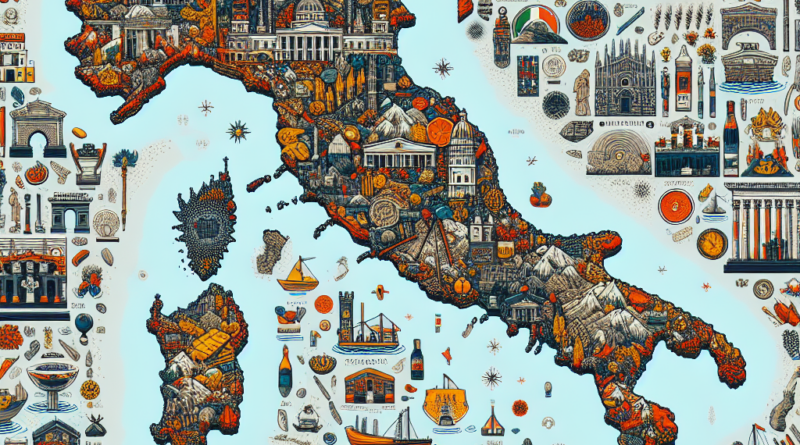Exploring the Origins of Italy’s Regional Names: A Deep Dive into Cultural Heritage
Discovering the Origins of Italy’s Regional Names
Italy is undeniably one of the richest countries in the world when it comes to history, traditions, and culture.
Each region you visit offers something unique and inimitable.
This beautiful nation showcases a remarkable unity, while also boasting a diversity in traditions and culture depending on the area you choose to explore.
Every region has its own story to tell, beginning with the origins of its name.
Have you ever wondered why the Lazio region is called that way? Or what about Lombardy? Here’s a complete breakdown of the etymology of Italy’s regions, region by region.
The Origins of Italian Region Names
There is a rich narrative behind the origins of the names of the Italian regions.
This article unveils the fascinating history behind them.
Abruzzo: The name derives from the Latin “Aprutium,” referring to an area associated with the ancient Pretuzi people.
Historically, the term was often used in the plural, “Abruzzi,” indicating two regions divided by the Pescara River.
Basilicata: In Roman times, this region was known as “Lucania,” likely named after the Lucani people.
The term “Basilicata” emerged in the 13th century, stemming from the Greek word “basilikos,” which referred to royal officials.
Calabria: The name is believed to originate from the Greek “Kalon-brion,” meaning fertile land, or from “Calabri,” referring to inhabitants of rocky regions.
Campania: Stemming from the Latin “campus,” which means field, or possibly from “Capua,” a city where the inhabitants were known as Capuani, evolving into Campani.
Emilia Romagna: Initially known simply as Emilia, named after the ancient Aemilian Way, the term “Romagna” was added in 1970, referring to the land of the Romans.
Friuli Venezia Giulia: Derived from “forum Iulii,” meaning the market of Julius, with “Venezia Giulia” being adopted later at the recommendation of linguist Graziadio Ascoli.
Lazio: Named after “Latium” by the Latins, ancestors of the Romans.
The name might also come from “latus,” meaning broad, denoting the area’s expanse.
Liguria: The etymology is unclear but is thought to derive from the ancient Liguri people, who occupied a larger region of northwestern Italy during pre-Roman times.
Lombardia: From “Langobardia,” the land of the Lombards, which comes from the ancient Germanic term “Langbärte,” meaning “long beard.”
Marche: The plural of “marca,” from the German “mark,” which signifies boundary or frontier.
It also designated land belonging to a marquis.
Molise: The name likely dates back to the Middle Ages, associated with the noble family De Molisio who settled in the area.
Piemonte: Meaning “at the foot of the mountains,” this term indicates the region’s location at the base of the northern Alps.
Puglia: Named after the ancient Indo-European population known as the Apuli, who settled in the region between the 2nd and 1st millennium BC.
Sardegna: Derived from “Sardinia,” the name used by the Romans to denote the island as “land of the Sardinians.” The Greeks initially referred to it as “Hyknusa” or “Ichnussa,” due to its coastal shape resembling a sandal.
Sicilia: Named after the Siculi people who inhabited eastern Sicily.
Some scholars suggest it derives from the Italic “Sica,” meaning “sickle,” interpreted as “land of the sickle bearers.”
Toscana: From the Etruscan people, called “Tusci” in Latin.
The territory was formerly known as Etruria or Tuscia.
Trentino Alto Adige: “Trentino” derives from the Roman name “Tridentum,” meaning “three teeth,” referencing the three hills in the area.
“Alto Adige” comes from the Adige River.
Umbria: Named after the ancient Umbri people who settled in the region.
The etymology remains uncertain.
Valle D’Aosta: Named after its capital, Aosta, founded by the Romans as “Augusta Pretoria,” eventually becoming Aosta.
Veneto: Derived from the ancient Veneti people who lived in the region prior to Roman rule.
The name might originate from the Indo-European root “wen,” meaning “to desire.”
For more insights into Italy’s rich culture, check out our article on the measles epidemic in Italy, exploring which regions are at greater risk in 2024.




